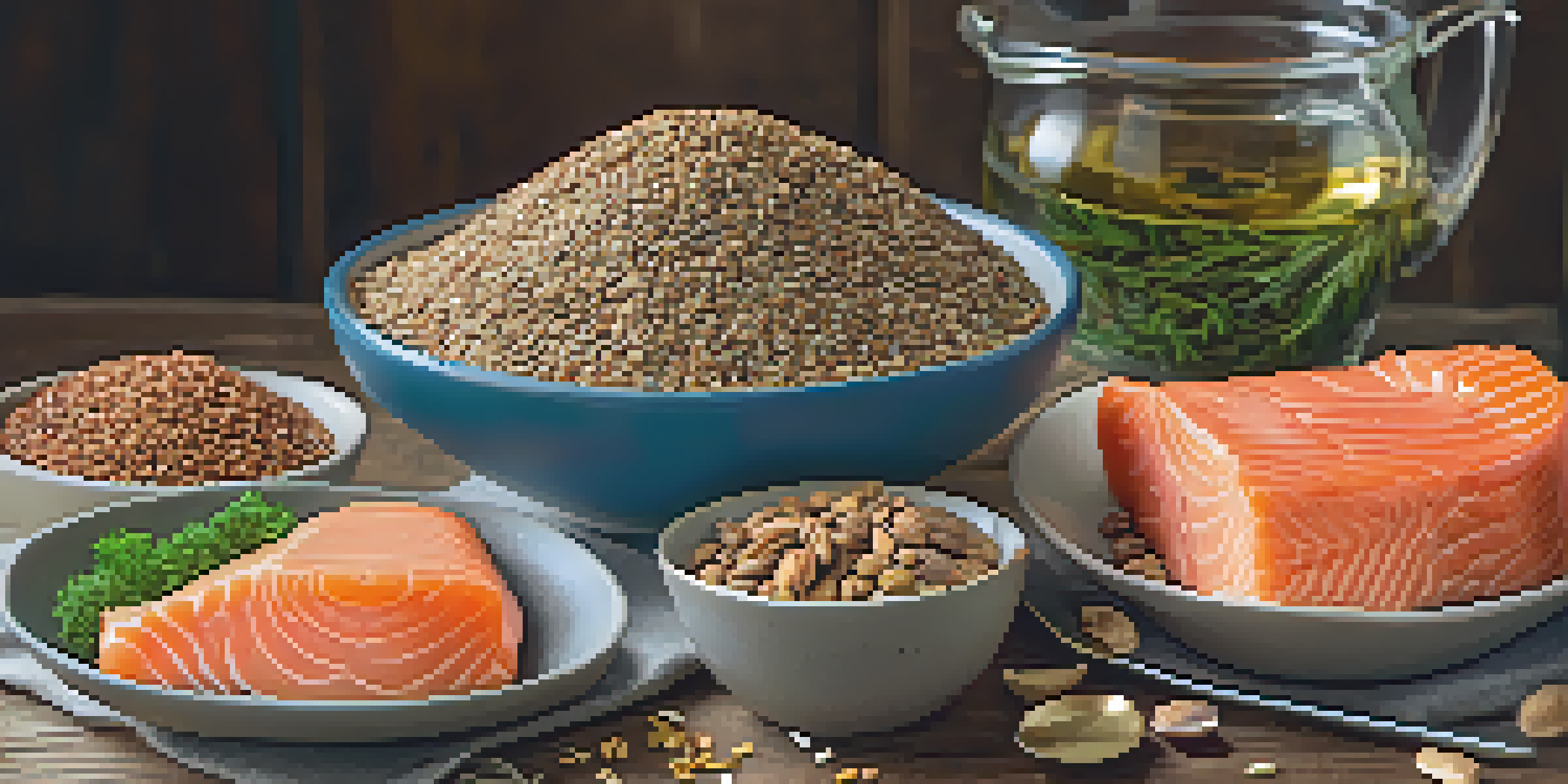The Importance of Omega-3s for Athletic Recovery

Understanding Omega-3 Fatty Acids and Their Benefits
Omega-3 fatty acids are essential fats that our bodies can't produce on their own, meaning we need to obtain them from our diet. These fats are primarily found in fish, flaxseeds, and walnuts, and they play a crucial role in various bodily functions. From reducing inflammation to supporting cardiovascular health, Omega-3s are vital for overall well-being, especially for athletes who put their bodies through intense workouts.
Omega-3 fatty acids are indispensable to the health of the brain and the heart.
For athletes, Omega-3s offer unique benefits that can positively impact performance and recovery. They help reduce exercise-induced muscle soreness, which allows athletes to train harder and more frequently. Additionally, they enhance joint health, making it easier to perform at peak levels without the nagging pain that can come from rigorous training.
Incorporating Omega-3s into your diet doesn't have to be complicated. Simple changes, like adding fatty fish to your meals or snacking on nuts, can boost your intake significantly. This not only supports athletic recovery but also contributes to long-term health.
The Role of Omega-3s in Reducing Inflammation
One of the standout benefits of Omega-3 fatty acids is their powerful anti-inflammatory properties. After strenuous exercise, the body often experiences inflammation, which can lead to soreness and delayed recovery. Omega-3s help combat this inflammation by promoting the production of anti-inflammatory compounds, making them crucial for athletes looking to bounce back quickly.

For example, a study published in the American Journal of Clinical Nutrition found that athletes who supplemented with Omega-3s experienced a reduction in muscle soreness after intense workouts. This means that incorporating these fatty acids can help athletes stick to their training schedules without being sidelined by pain.
Omega-3s Reduce Inflammation
These fatty acids help combat exercise-induced inflammation, promoting quicker recovery and less muscle soreness for athletes.
Moreover, Omega-3s can also aid in recovery from injuries. By reducing inflammation around injured areas, these fatty acids can speed up healing times, allowing athletes to return to their sport sooner. This makes Omega-3s not just beneficial for recovery but also a key player in injury prevention.
How Omega-3s Support Muscle Recovery
Muscle recovery is an essential aspect of any athlete's training regimen, and Omega-3s play a significant role in this process. These fatty acids help facilitate protein synthesis, which is vital for muscle repair after workouts. When you push your muscles to their limits, they need the right nutrients to recover and grow stronger, and Omega-3s provide that support.
You are what you eat, and if you eat junk, you will be junk. If you eat well, you will feel well.
Additionally, research has shown that Omega-3 supplementation can help enhance muscle performance in older adults, suggesting that their benefits extend across age groups. For younger athletes, this means that integrating Omega-3s into their diets can lead to more efficient recovery and improved overall performance.
Practical ways to incorporate Omega-3s into your post-workout routine include smoothies with flaxseed or a salmon salad. These options not only taste great but also deliver the nutrients your muscles crave after a tough session.
The Mental Benefits of Omega-3s for Athletes
While the physical benefits of Omega-3s are well-documented, their impact on mental performance is equally important for athletes. These fatty acids are known to support brain health, enhancing cognitive function and mood. A clear mind can significantly affect an athlete's performance, as focus and mental resilience are crucial in competitive sports.
Studies have shown that Omega-3s can help reduce anxiety and depression, which can be prevalent among athletes due to the pressures of competition. By incorporating these fatty acids into their diets, athletes can better manage stress and maintain a positive outlook, essential for peak performance.
Support Muscle Recovery
Omega-3 fatty acids facilitate protein synthesis, essential for muscle repair and growth after intense workouts.
Incorporating Omega-3-rich foods like chia seeds or fatty fish into meals can be a simple way to support mental health. Smoothies, salads, and even snacks can be transformed into brain-boosting treats that keep athletes sharp and focused.
Choosing the Right Omega-3 Supplements
For those who find it challenging to get enough Omega-3s through diet alone, supplements can be a convenient option. Fish oil capsules are the most common type of Omega-3 supplement, but plant-based alternatives like algal oil are available for those following vegetarian or vegan diets. It's essential to choose high-quality supplements to ensure you're getting the maximum benefits.
When selecting an Omega-3 supplement, look for products that are tested for purity and sourced from sustainable fisheries. This not only ensures that you're consuming a safe product but also supports environmental responsibility. Reading labels and checking for certifications can help you make informed choices.
It's also worth consulting with a healthcare professional before starting any supplementation, especially for athletes with specific dietary needs or health concerns. They can provide personalized advice on the right dosage and type of Omega-3s to incorporate into your routine.
Incorporating Omega-3s into Your Daily Diet
Incorporating Omega-3s into your daily diet can be both enjoyable and straightforward. Focus on adding a variety of foods rich in these essential fats. Fatty fish like salmon, mackerel, and sardines are excellent sources, but don't overlook plant-based options like chia seeds, flaxseeds, and walnuts.
Meal planning can be a useful strategy to ensure you're getting enough Omega-3s. Consider preparing meals that feature Omega-3-rich ingredients, like a quinoa salad topped with walnuts or a smoothie with flaxseed. This way, you can easily integrate these nutrients into your daily routine without feeling overwhelmed.
Boost Mental Performance
Incorporating Omega-3s into an athlete's diet can enhance cognitive function and mood, critical for maintaining focus during competitions.
Additionally, experimenting with different recipes can make the process fun and flavorful. Whether it’s trying new seasoning on grilled fish or adding nuts to your breakfast oats, finding creative ways to include Omega-3s will enhance your meals while benefiting your athletic recovery.
Final Thoughts on Omega-3s and Athletic Recovery
In conclusion, Omega-3 fatty acids are a powerhouse for athletic recovery. Their anti-inflammatory properties, support for muscle repair, and mental benefits make them indispensable for athletes of all levels. Incorporating these essential fats into your diet can lead to improved performance, quicker recovery times, and better overall health.
As you consider your nutrition plan, remember that every little change counts. Whether it's adding a serving of fatty fish to your weekly meals or opting for a high-quality supplement, small adjustments can yield significant benefits. Consistency is key, and over time, you’ll likely notice the positive impact on your training.

Ultimately, the journey to optimal recovery is a holistic one. By prioritizing Omega-3s alongside other healthy lifestyle choices, athletes can unlock their full potential and enhance their performance in the long run.